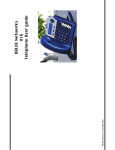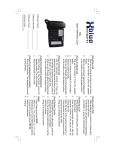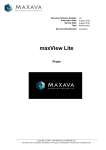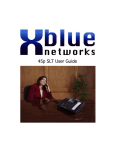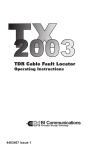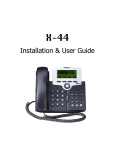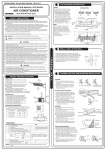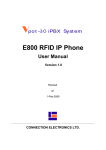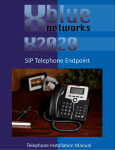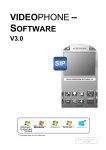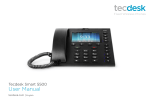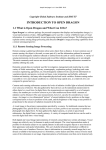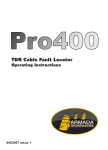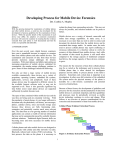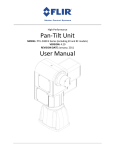Download User Guide - XBLUE Networks
Transcript
XBLUE Networks X16 Telephone User guide X16 User Guide Revision Table Revision Issue 2 – PAL Description of Changes This manual supersedes all other manuals Page 13 – There was a hidden line behind the graphic. Page 14 – Adjusted numbering within “Add new Record”. Page 18 – added a voice mail button graphic Page 20 – adjusted graphic to exclude VM Page 29 – Busy CO Line – added New LIU function. Page 33 – fixed typo in call forwarding Page 36 – fixed typo in Muted Ring Page 36 – fixed typo in New Message Playback Page 39 – fixed typo in Set Relocation Page 40 – fixed typo in Transfer Page 45 – fixed typo in One Touch Record Page 46 – fixed typos in Using AME Preliminary Release – PAL Date Released 06-09 11/2007 Table of Contents Reproduction, publication, or duplication of this manual, or any part thereof, in any manner, mechanically, electronically, or photographically, is strictly prohibited. © Copyright 2006 by XBLUE Network, LLC. All rights reserved. The information contained in this document is subject to change without notice and should not be construed as a commitment by XBLUE Networks, LLC,; XBLUE Networks, reserves the right, without notice, to make changes to equipment design as advances in engineering and manufacturing methods warrant. Any and all toll charges are the sole responsibility of the user of the installed equipment; XBLUE offers no warranty or will assume any responsibility for any toll charges. Trademarks: XBLUE, XBLUE Networks, X16 are trademarks of XBLUE Networks, LLC. All trademarks are the property of their respective owners. Issue 2 -2- Table of Contents TABLE OF CONTENTS ............................................................................................. 3 NOTICES................................................................................................................ 6 FCC INFORMATION ................................................................................................ 6 INTRODUCTION ..................................................................................................... 7 FEATURES.............................................................................................................. 7 GETTING TO KNOW THE X16 TELEPHONE ................................................................... 8 GETTING TO KNOW THE X16 DISPLAYS ..................................................................... 8 DEFAULT BUTTON LAYOUT .................................................................................... 9 GETTING STARTED ...............................................................................................10 ANSWERING A CALL ..............................................................................................10 MAKING A CALL ...................................................................................................10 Intercom .....................................................................................................10 Telephone Line (CO Line) .............................................................................11 VOLUME CONTROL ...............................................................................................11 Ringing Volume ...........................................................................................12 Speakerphone Intercom Volume ...................................................................12 Speakerphone Network Volume ....................................................................12 Handset Intercom Volume ............................................................................12 Handset Network Volume .............................................................................12 Forced Ringing Intercom Volume ..................................................................12 PHONE BOOK ........................................................................................................13 View Records ...............................................................................................13 Dial displayed record ....................................................................................13 Delete Phone Book Records..........................................................................13 Add New Record ..........................................................................................14 CALLER ID ............................................................................................................15 Navigating through Caller ID ........................................................................16 Receiving Caller ID .......................................................................................17 VOICE MAIL ..........................................................................................................18 PROGRAMMING.....................................................................................................19 PROGRAM NAVIGATION .........................................................................................20 PHONE SETUP .....................................................................................................21 Issue 2 -3 - Table of Contents NAVIGATION KEYS ................................................................................................. 9 X16 User Guide PROGRAMMABLE FEATURE BUTTONS ...................................................................26 Programming Steps......................................................................................27 FEATURES.............................................................................................................28 Table of Contents DESCRIPTION AND OPERATION ...............................................................................28 ALL PAGE ...........................................................................................................28 ANSWERING MACHINE EMULATION ..........................................................................28 AUTO ATTENDANT - VOICE MAIL (STANDARD) ...........................................................28 BACKLIT BLUE LCD DISPLAY ..................................................................................29 CALL PICK UP ......................................................................................................29 CALL TIMER ........................................................................................................29 CALLER ID AND CALL WAITING CALLER ID (TYPE 1 & TYPE 2)......................................29 CALLER ID ENABLE/DISABLE ..................................................................................29 CO LINE BUSY/IDLE STATUS (LED).........................................................................30 CO LINE RINGING – PER EXTENSION .......................................................................30 CONFERENCE – 3-WAY ..........................................................................................30 CONFERENCE – EXPRESS CONFERENCE .....................................................................31 CONVERSATION RECORDING – VOICE MAIL (STANDARD) .............................................31 DAYLIGHT SAVINGS – AUTOMATIC (USING CID) ........................................................31 DIRECT CO LINE ACCESS ......................................................................................31 DIRECT MAILBOX TRANSFER - VOICE MAIL (STANDARD) ..............................................32 DIRECT STATION SELECT (DSS) – BUSY LAMP FIELD (BLF) .........................................32 DISTINCTIVE RINGING – RINGER TYPE .....................................................................32 DO NOT DISTURB (DND) ......................................................................................32 FLASH ...............................................................................................................33 FLASH TIMER ......................................................................................................33 FORWARD ..........................................................................................................33 HANDS FREE CALLING ...........................................................................................34 HANDSET/HEADSET VOLUME CONTROL.....................................................................34 HEADSET ACTIVATION ..........................................................................................34 HOLD ................................................................................................................35 HOT DIAL PAD ....................................................................................................35 INTERCOM CALLING ..............................................................................................35 INTERCOM PAGING ...............................................................................................35 LINE STATUS DETECTION (LINE IN USE) ...................................................................35 MEMO RECORDING - VOICE MAIL (STANDARD) ..........................................................36 MESSAGE WAITING (TELEPHONE COMPANY-FSK) .......................................................36 MULTILINGUAL EXTENSIONS ...................................................................................36 MUSIC ON HOLD INPUT .........................................................................................36 MUTE WITH LED INDICATION .................................................................................36 MUTED RING (RING ALERT) ...................................................................................37 NAVIGATION KEYS ...............................................................................................37 NEW MESSAGE PLAYBACK - VOICE MAIL (STANDARD) ..................................................37 PAGING .............................................................................................................37 MEET ME ANSWER (PAGING) .................................................................................37 Issue 2 -4- FUNCTIONS ............................................................................................... 41 Features and LED function .................................................................................. 41 Lamp Cadence ................................................................................................... 41 Lamps on Phone ................................................................................................ 42 Intercom Tone Plant .......................................................................................... 42 LED Cadence and Status Table ........................................................................... 42 Ringing Cadence ................................................................................................ 43 IDLE LCD DISPLAY ..................................................................................... 43 VOICE MAIL ............................................................................................... 44 AUTO ATTENDANT ...................................................................................... 44 PERSONAL MAILBOX .................................................................................... 44 Memo Recording ................................................................................................ 44 Once Touch Record ............................................................................................ 44 Answering Machine Emulation (AME) .................................................................. 45 Playing New Messages ....................................................................................... 45 Deleting Messages ............................................................................................. 46 Voice Mailbox Quick Start Guide .......................................................................... 46 REMOTE COMMANDS.................................................................................. 48 REMOTE ACCESS ........................................................................................ 48 INDEX ....................................................................................................... 49 Issue 2 -5 - Table of Contents PAUSE ...............................................................................................................37 PERSONAL MAILBOX - VOICE MAIL (STANDARD) .........................................................38 PHONE BOOK DIALING ..........................................................................................38 PRIVACY (PRIVACY RELEASE) .................................................................................38 PROGRAMMABLE BUTTONS (12) ..............................................................................38 REDIAL (LAST 6 NUMBER REDIAL) ...........................................................................38 RING ALERT (MUTED RINGING) ..............................................................................38 RINGING (AUDIBLE AND VISUAL) .............................................................................39 RINGER VOLUME CONTROL ....................................................................................39 ROOM MONITOR ..................................................................................................39 SETTING TIME AND DATE (AUTOMATIC) ...................................................................39 SET RELOCATION .................................................................................................39 SPEAKERPHONE WITH LED.....................................................................................39 SPEED DIAL BINS.................................................................................................39 TIME IN DISPLAY .................................................................................................39 TONE/PULSE .......................................................................................................40 TRANSFER – EXTENSION TO EXTENSION ...................................................................40 TRANSFER – DIRECT TO VOICE MAIL .......................................................................40 VOLUME ADJUSTMENTS .........................................................................................40 VOICE MAIL (STANDARD) ......................................................................................41 WAITING TIME ....................................................................................................41 X16 User Guide Notices Hearing Aid Compatibility: The digital telephone endpoints are hearing aid compatible, as defined in section 68.316 of Part 68 FCC Rules and Regulations. UL/CSA Safety Compliance: The X16 system has met all safety requires, and found to be in compliance with the Underwriters Laboratories (UL) 60950-1. Warning: This service information is designed for experienced repair technicians only and is not designed for use by the general public. It does not contain warnings or cautions to advise non-technical individuals of potential dangers in attempting to service a product. Products powered by electricity should be serviced or repaired only by experienced professional technicians. Any attempt to service or repair the product or products dealt with in this service information by anyone else could result in serious injury or death. Notices This equipment generates, uses, and can radiate radio frequency energy, and if not installed and used properly, that is, in strict accordance with the instruction manual, may cause interference to radio and television reception. This equipment has been tested and found to comply with the limits for a Class B computing device in Subject J of Part 15 of FCC Rules, which are designed to provide reasonable protection against such interference. However, there is no guarantee, or warranty, that interference will not occur in a particular installation. If this equipment causes interference or fails to operate correctly, due to radio frequency interference (RFI) or electromagnetic interference (EMI), it will be fixed at the owners‟ expense. FCC Information Provide the Telephone Company with the following FCC Information: Item Specification FCC Registration D6XKH05BX16 Ringer Equivalence 0.5B Networks Address Signaling E Required Network Interface RJ11 & RJ14 Issue 2 -6- Introduction The X16 system is a full featured, next generation, multi-line business telephone system ideal for both home and small office environments. It comes equipped to interface with 4 Central Office (CO) Lines, equipped to receive Caller ID, and sixteen (16) proprietary digital telephone endpoints. The system can be expanded to accommodate an additional two (2) CO Lines, allowing a maximum configuration of six central office telephone lines. In addition, the system comes standard with Auto Attendant and all digital telephone endpoints have a personal digitally integrated voice mailbox. Features Issue 2 Intercom Calling Intercom Paging Meet me Answer (Paging) Memo Recording Introduction Auto Attendant (Standard) Answering Machine Emulation Audible and Visual Ringing Backlit LCD Display with Power saver mode Call Timer Call Transfer Caller ID and Call Waiting Caller ID Caller ID Enable/Disable per extension CO Line Busy/Idle Status (LED) CO Line Ringing (programmable) Conference (3-way) Conversation Recording Daylight Savings (Automatic with Caller ID) Direct Mailbox Transfer Direct Station Select (DSS) Busy Lamp Field (BLF) Display Number Dial Distinctive Ringing Do Not Disturb Flash Timer Handset/Headset Volume Control Headset Activation Holiday Operating Mode Hold Message Waiting (Telco-FSK) Multilingual Display per Extension Music on Hold Internal/External Mute with LED indication Navigation Keys New/All Message Play Phone Book Dialing Programmable Buttons (12) Programmable Pause (Speed Bins) Redial Remote Message Pickup Ringer Volume Control Set Time and Date Speakerphone with LED Speed Dial Buttons Time in Display Tone/Pulse Voicemail (standard) Weekend Operating Mode -7 - X16 User Guide X16 Telephone Tour Backlit Display Navigation Keys Integrated Headset Programmable Keys X16 Telephone Tour Speakerphone Button Getting to know the X16 Displays Time, Date and Day Extension Number New Voicemail Phone Book Line Keys Caller ID Log Issue 2 Program Key -8- Default Button Layout CO Lines with Integrated CID Programmable Feature Buttons Default Button 12 Key Dial Pad Fixed Keys: Delete, Conference, Feature, Transfer, Redial, Hold, Mute and Speaker Navigation keys Scroll left or right to update the LCD Display. Scroll Up Backup a level Scroll Right Scroll Left Scroll Down Issue 2 Voice Mail Access OK/Select/Confirm -9 - X16 User Guide Getting Started Congratulations on purchasing your new XBLUE Networks communications server. This state of the art server incorporates easy to use features, in a comprehensive telephone and voice mail system. Answering a call There are two types of calls; intercom and network. Calls from one extension to another extension are considered intercom calls. Network calls are calls made through a telephone company line and are often called Central Office (CO) lines or just lines. Intercom calls – When another extension dials your telephone number the system allows you to speak to each other without pressing the speaker button or going off hook. Getting Started Network calls – Calls coming from a network facility (Telephone Company) will ring the telephone. When the telephone is ringing, lift the handset, or press the speaker button to answer the call. Making a call Intercom Press the preprogrammed feature button or dial the extension number to place a call to another extension. You may converse freely or lift the handset to speak privately. The Direct Station Select (DSS) also known as Busy Lamp Field (BLF) allows you to press one button to dial an extension and to see if an extension is busy. In this example, extension 302, 303, 304 and 306 are busy. Issue 2 - 10 - Telephone Line (CO Line) When placing a network call, Telephone Company, press the line button or dial 9 to access a line. You can speak on the speakerphone, or lift the handset to speak privately. Line buttons that are unlit are free to use. If they are lit blue they are busy and the line that you selected will be lit green. Line#4 12:13 This timer begins once the CO Line is selected. Getting Started The display will show the selected CO Line. The select line button lights green Volume Control Speakerphone Handset Ringing Issue 2 Description There are a total of eight (8) volume settings. Valid selections are 1 through 8 There are a total of five (5) network settings volumes, 1 (lowest) through 5 (Highest). There are a total of five (5) volume settings, off and 1 through 4 - 11 - X16 User Guide Ringing Volume While your telephone is idle or ringing, use the volume up key to increase or the volume down key to decrease the ringing volume. Speakerphone Intercom Volume While using your speakerphone, use the volume up key to increase or the volume down key to decrease the speakerphone volume. Speakerphone Network Volume While using your speakerphone, use the volume up key to increase or the volume down key to decrease the speakerphone volume. Handset Intercom Volume Getting Started While speaking to another extension using your handset, use the volume up key to increase or the volume down key to decrease the handset volume. Handset Network Volume While speaking on a telephone company line, using your handset, use the volume up key to increase or the volume down key to decrease the handset volume. Forced Ringing Intercom Volume Calls between extensions are answered hands free and will not forward to voicemail. To forward intercom calls to voicemail, press the “” key, which will force the extension to start ringing. Issue 2 - 12 - Phone Book There are fifty phone book locations, each can up to 24 digits, and a name of up to 16 characters. Last Selection View Records: Add New Record Phone Book Next Selection Phone Book View Records Press the Phone book button to view the phone book records. Use the up or down arrow to select between “view records” and “add new record”. Use the center navigation key to select Dial Displayed Record Once a record is selected, press the select (center navigation) button, the name and number will be displayed. Press the select button again and “Dial” will replace the displayed telephone number. Press the select button again to dial the selected entry. Delete Phone Book Records Issue 2 Press the delete button when the record is displayed. Use the up or down arrow to select “Yes” to delete or “No” to save the records. - 13 - X16 User Guide To delete all records, scroll to the end of the list and press the delete button. Use the up or down arrow to select “Yes” to delete or “No” to save the records. Add New Record (Enter Name) Done 1. 2. Phone Book Enter the name that will be associated to the number that will be entered. Press Done – Press the navigation up or down key to change to “Cancel” press the center to advance to the next or cancel. 1 2 3 4 5 6 7 8 9 0 * # 1st 2nd , a b d e g h j k m n p q t u w x Space or 0 * # 3rd „ c f i l o r v y Character 4th & A D G J M s T z Input Keyboard 5th 6th 7th . ( ) B C 2 E F 3 H I 4 K L 5 N O 6 P Q R U V 8 W X Y 8th @ 9th ! S 7 Z 9 10th 1 (Enter Number) Done 3. Issue 2 Enter the number that will be associated with the entered name. - 14 - 4. Press Done – Press the navigation up or down key to change to “Cancel” press the center to advance to the next or cancel. Caller ID Caller ID is a standard feature of the system. When received from the telephone network, it will identify caller and synchronize the date and time of the system. Each call into the system is stored in the Caller ID list. Caller ID 07:15P 01/17 WED NEW CID:04 301 Caller ID To review the Caller ID list, Press the Caller ID Button. To delete one of the entries, press the delete button while it is displayed. To delete all of the entries in the Caller ID list, press the Caller ID button, and then the delete button. ALL CID:00 NEW CID:04 Press the delete key to delete all Caller ID entries. Issue 2 - 15 - X16 User Guide Navigating through Caller ID Oldest Number More Information Select Most Recent 1. 2. Press the Caller ID button and the use the up or down navigation keys to scroll through the list of inbound Caller ID calls. Press the select button to dial the displayed telephone number. 1-831-601-7283 L1 Caller ID CALIFORNIA 3. Press the right navigation button for more information about this call. 07:47P 10/16 Index#05 4. L1 Press the select button to enter the “Dial Alternate” area. This is where you can select the number of digits required to successfully make the display telephone call. Use the right arrow key to select between 7, 8, 10 and 11 digits. 1-831-601-7283 Dial Alternate Issue 2 - 16 - Press the select button again to dial the displayed number. Press the navigation scroll up or scroll down key to start the copy to the phone book. 1-831-601-7283 Cpy To Phonebook 7. Press the select button, to store the displayed name and telephone number into the phone book. Names such as “Out Of Area”, “Private”, “Unknown” will not be stored. Receiving Caller ID 1) If two lines ring simultaneously, the Caller ID of the first call into the system will be displayed. 2) The system is equipped with Type 2, Call waiting Caller ID. a. If the CO Line has call waiting caller ID, and a second call is received on an answered CO line, a “Beep Tone” will be heard, and the CID of the second call will be displayed. 3) While on a CO Line call, press the Left or Right navigation key to display the CID of another ringing CO line. The number “Lx” where x = the CO Line number will be displayed on the upper right side of the display. AUTO MUTE 913-599-2583L1 XBLUE Networks Issue 2 - 17 - Caller ID 5. 6. X16 User Guide Voice mail The center navigation button is equipped with a Light Emitting Diode (LED) which flashes when you have a new voice mail message. At default the LED will be lit indicating that the extension is forwarded to voice mail. Calls can be transferred directly to a user‟s voice mailbox by pressing your voicemail button while on a call and dialing the desired extension number, and then simply hang up. Voice mail To access your voice mailbox: From an idle telephone o Press the center navigation key. o Enter Password (at default 123) o The voice mail count will be announced o The time and weekday will be announced o The messages will play in newest to oldest order. Each message is automatically saved after it has been played. To scroll through saved messages, use the left and/or right navigation keys. To delete the message press the “delete” button twice or the “delete” button and then the center navigation button, this confirms the deletion of the message. Voice Mail Access Fwd to VM (lit) Last VM Message Next VM Message Transfer CO Lines calls to directly to voice mail Issue 2 - 18 - Programming The system has two areas of programming; Phone (extension) and System. The Phone Setup programming parameters only affects the extension that is doing the programming; whereas, the system programming parameters affect the whole system. From an Idle telephone press the program button Programming 01:16A 12/10 SUN 301 Program Button Press the center navigation key to select “Phone Setup” and then scroll through the phone programming. Select Phone Setup System Setup Extension parameters such as the voicemail OGM will remain for up to 120 seconds when an extension is unplugged or being relocated. To relocate an extension simply unplug it and plug it into another extension port. Note: Extensions appear busy to all other extensions when they are in Programming or reviewing caller ID. Issue 2 - 19 - X16 User Guide Program Navigation Scroll Up Backup a level Scroll Left Voice Mail Access Fwd to VM (lit) Scroll Right Scroll Down OK/Select/Confirm Programming Feature Default (shown in bold) Language Feature Key Extension No. Auto Mute Preference Call Line Selection Record All Call Hold Reminder Ringer On/Off Ringer Type 2nd Call Beep LCD Backlight Caller ID Call Forward Voice Mail Setup Remote code (Internal Password) Personal Outgoing MSG (OGM) Clear My MSG Call Screening User Name Reset Phone English, French, Spanish 301 – 399 Off Intercom or CO Call 1–4 Off 30 On (CO Line 1 – 6) 1 (CO Line 1 – 6) Off On On Voicemail/ External/ TRK2TRK 123 On Note: Extensions appear busy to all other extensions when they are in Programming or reviewing caller ID. Issue 2 - 20 - Phone Setup AUTO MUTE Phone Setup Phone Setup – The parameters are used by the end user to customize their telephones. AUTO MUTE Language =English Language – Each telephone user can select between three different languages; English, Spanish, and French. AUTO FeatureMUTE Key Feature Key – Each extension has 12 programmable buttons which can be customized by each user. AUTO MUTE Auto Mute Issue 2 Extension Number – Valid numbers are 301 through 399. Changing this number may result in a loss of extension configuration settings. Changing this parameter will result in the loss of some extension settings, such as voicemail notification. Programming AUTO MUTE Extension No. Auto Mute – This feature is used to allow extensions to call you, and make an announcement; your microphone is automatically muted so callers cannot hear the conversation. This is also called Page Mode. - 21 - X16 User Guide AUTO MUTE Preference Call AUTO MUTE Line Selection Preference Call – The user can select from accessing a CO Line or Intercom when going off hook. Line Selection – Each digital telephone endpoint user can set their telephone to directly access a CO Line or group of lines. Programming AUTO MUTE Record All Call =Off Record all Calls – This parameter, when enabled, will record all network calls answered by this extension. AUTO MUTE Hold Reminder =30 Seconds When a call is placed on hold this timer starts. Each time this timer expires, a beep is heard to remind you that a call is hold. AUTO Ringer MUTE On/Off Line1 Ringer Line2 Ringer Line3 Ringer Line4 Ringer Line5 Ringer Line6 Ringer Issue 2 Extension users can program CO Lines to ring (on), or not ring (off), by pressing the up or down navigation key. Each CO Line can be programmed individually. =On =On =On =On =On =On - 22 - AUTO Ringer MUTE Type Ringer Type – Each extension user can select from 6 different ring tones for each of the 6 CO Lines. Press the navigation key up or down to scroll through the different tones. Line1 Ring Type =Type-1 Line2 Ring Type =Type-1 Line3 Ring Type =Type-1 Line4 Ring Type =Type-1 Line5 Ring Type =Type-1 Programming Line6 Ring Type =Type-1 AUTO 2nd CallMUTE Beep = Yes If a second call rings into the system while you are on a call you will hear a beep tone. Change this parameter to “No” to eliminate the tone. AUTO MUTE LCD Backlight =On When set to “Off” the backlit display will go into power saver mode and go dark after 60 seconds. It will illuminate if it rings or a button is pressed. AUTO MUTE Call Forward Call Forward – Each extension can select where calls will be forwarded to when they are busy or when a call goes unanswered. AUTO WaitingMUTE Time =10 Seconds Issue 2 Waiting Time – The call waiting time is the amount of time a call will ring before it is sent to the programmed destination. Waiting Time uses the up or down navigation key to select from 00 (immediate Forward to 25 seconds.) The default is 10 seconds. - 23 - X16 User Guide AUTO MUTE FWD Destination AUTO MUTE =Off FWD Destination Forward Destination – Extension users may select from three destinations; Off, Voice Mail, External Call and Trunk2Trunk. Off – Calls will not forward Voice Mail – Calls will be forwarded to the users‟ personal mailbox. The center navigation button will be lit solid. External – The system will transfer an incoming caller, using a second CO Line, to an external destination. Note: External Call forward uses two CO Lines, and you may experience a volume loss when analog lines are connected using this feature. Also, toll charges may apply. If all CO Lines are busy, the call will not forward. Programming TRK2TRK – Allows calls to be transferred to an external destination using the telephone networks facilities. This may require special features from the network provider. AUTO MUTE FWD PhoneNumber =(Empty) AUTO MUTE VoiceMail Setup AUTO RemoteMUTE Code Issue 2 Phone Number- Enter the telephone number to be dialed when the External or TRK2TRK forward timer expires. This can be any external telephone number such as a cellular or home telephone number. Each extension can set up their own voice mail parameters. Remote Code – The remote code is the code that is used to access your voice mailbox both internally and when connected from a remote location. The default remote code is 123. - 24 - Personal OGM – This greeting is heard by a caller once they are forwarded to someone‟s voice mailbox. Press the Select button to Play and Stop the playing message. Press the up button to re-record the Outgoing Message. AUTO MUTE Personal OGM Play 1st 1 2 3 4 5 6 7 8 9 0 * # , a b d e g h j k m n p q t u w x Space or 0 * # AUTO MUTE Reset Phone Issue 2 2nd Character Input Keyboard 3rd 4th 5th 6th 7th 8th 9th 10th „ c f i l o r V y & A D G J M s T z . B E H K N P U W ( C F I L O Q V X ) 2 3 4 5 6 R 8 Y @ ! 1 S 7 Z 9 Programming User Name – Each extension can be programmed to display up to 12 characters of the extension user‟s name. Once in the name entry field, the dial pad becomes the character input keyboard. Each depression of the number will change the character in the following way. AUTO MUTE User Name Reset Phone – The reset function will bring the digital endpoint back to default. Press the up navigation key to select “Yes?” to default the telephone or select “No?” to exit without defaulting the telephone. - 25 - X16 User Guide Programmable Feature Buttons Each digital telephone endpoint has twelve (12) programmable feature buttons, which can be customized by each extension user. There are three programmable feature button categories. Selections DSS/BLF Key SPD Key Programming Feature Key Issue 2 Description Direct Station Select (DSS) – allows extension users to press one button to dial another extension. In addition, the DSS button doubles as Busy Lamp Field (BLF). The BLF shows the status, idle or busy, of other extensions. Each of the (twelve) 12 buttons can be programmed as a speed dial key. Input the number to be dialed once the key is identified as a speed key. Simply press the speed key to dial the number once it is programmed. “Feature + ” will enter a pause, shown as a P. Feature + = Record Feature + = Open Feature + = Flash Key Feature + = DND Feature + = Mute Feature + = Conference Feature + = Pause Feature + = Redial Feature + = Headset Feature + = All Page Feature + = Open Feature + = Open - 26 - Programming Steps Step 1 – Press the programming button Step 2 – Select phone setup Step 3 – Press the select (center) navigation key Step 4 – Press the down navigation key and select “Feature Key” Step 5 – Press the center navigation button to begin Step 6 – Press the up or down navigation key to select the feature button to be programmed or press the feature key to be programmed. AUTO MUTE Select FTR Key Programming The display will show the selected FTR button. The display below shows FTR#01, FTR button 1, was pressed. AUTO MUTE FTR#01:DSS/BLF =301 Step 7 – Press the Program button to exit programming, and not modify the current button programming or press the center button to change the current setting. AUTO FTR#01MUTE =DSS/BLF Key Step 8 – Using the up or down navigation keys, select between DSS/BLF, Speed Key, or Feature. Step 9 – Press the select button to display the current programmed function. Step 10 – Enter the appropriate extension, speed dial number or use the up or down navigation keys and select the desired feature. Step 11 – Press the select button to confirm the selection. Issue 2 - 27 - X16 User Guide Features Description and Operation All Page At default, one of the flexible buttons is preprogrammed as an “All Page” button. From an idle telephone you may press this button or dial the feature code “Feature + ” to page someone through all of the telephone speakers. The paged party can answer the page, while active, by pressing the “All Page” button from another phone. Answering Machine Emulation This feature “Mimics” the call screening feature of an answering machine. Within a specific time after a call is answered by an extension users‟ voice mailbox, that user can monitor/screen callers as they leave a message. Features The extension user will receive a warning tone, which indicates that a caller has been answered by their voice mailbox. The user has the option to monitor the caller or ignore the alert and allow the caller to leave a message. Once the user has selected to monitor the caller, they have the option to leave the caller undisturbed (leaving a message) or to retrieve the caller from the voice mailbox and be connected to the caller for a live conversation. Operation 1) Call Rings an extension, either directly or from the auto attendant. 2) The call is forwarded, if programmed, to the user‟s voice mailbox. 3) The Voice mail button (center navigation) will flash rapidly, which is your indication that someone is in your mailbox leaving a message. 4) After the center button is pressed, the calling party will be heard. 5) Lift the handset to retrieve the caller from the voice mailbox. 6) To exit and not retrieve the caller, press the left navigation button Auto Attendant - Voice Mail (Standard) The automated attendant can be programmed, in system programming, to answer incoming calls. Callers are then directed to enter, and be transferred to, their desired extension. The system can be programmed to ring only the auto attendant, only the attendant, or ring all telephones, that are programmed to ring, and then go to the auto attendant for processing. Issue 2 - 28 - Backlit Blue LCD Display Each digital telephone endpoint (speakerphone) comes equipped with a backlit display, which can be programmed to go into power saver after it has being idle for 60 seconds. The backlit display is immediately activated whenever an action such as ringing, going off hook or pressing any of the fixed or preprogrammed buttons, is taken. There are two types of call pick up, intercom and CO Line. In both cases, the telephone that has the call picked up from must be ringing. Intercom – When one extension calls another extension, but the called party is not there, the calling party presses the key to activate ringing. If the extension user of the called party hears their extension ringing, they may press the key on any other telephone endpoint and pick up the actively ringing call. CO Line – Transferred Telephone Company Lines can be picked up by another extension by press the key on their telephone endpoint. When the key is pressed the first ringing extension will be picked up. When the key is pressed the first transferred CO Line will be picked up. Call Timer When making or receiving a call the backlit display shows the time that the call has been connected in four digit format (00:00). If the call exceeds 99 minutes and 59 seconds (99:59) the timer will begin again. Caller ID and Call Waiting Caller ID (Type 1 & Type 2) The telephone company offers two types of caller ID; type 1 and type 2. Type 1 caller ID presents the caller‟s name, number (when available) and the date and time of each call. Type 2 incorporates all of the features of type 1 plus it adds call waiting, caller ID. The system will automatically begin working with caller ID when the user subscribes for the telephone companies Caller ID service, and it will set the system‟s time and date. Caller ID Enable/Disable Caller ID can be enabled or disabled at each telephone endpoint (speakerphone). When disabled, the extension will not receive or have access to Caller ID. When Caller ID is disabled, and the button is pressed, a tone will be heard indicating that Caller ID is not accessible. Issue 2 - 29 - Features Call Pick up X16 User Guide CO Line Busy/Idle Status (LED) Each CO Line button has an associated dual color Light Emitting Diode (LED), which lights when the line is in use and remains unlit when the line is idle. When the user presses a Line button the LED will illuminate green (I-use) on their telephone and blue (busy) on all telephones. The Line button will light blue (busy) when a device which is connected to a telephone company line, in front of the system, is off hook. Once off hook, only one digital telephone endpoint may access the line by presses the busy line button, all others will receive busy tone. CO Line Ringing – Per Extension Each extension can be programmed to ring when a call is received on a specific CO Line. At default, all CO Lines ring on all extensions. This may not be ideal for all installations, so each extension can be programmed to ring, or not ring. Conference – 3-way Features An extension may conference two external parties, or one internal and one external party, together so that they may all converse. (Privacy Release may affect the operation of this feature) A conference call cannot be recorded. The system can have two, 3-way calls simultaneously. To create a conference: 1) Put the first call on Hold 2) Make the second intercom call or CO Line call. After the third party answers the call press the “Conf” button. 3) The three parties will be joined together in a conference. AUTO MUTE Conf#1+3 00:00 99135992583 Issue 2 - 30 - Conference – Express Conference Express Conference is a quick and easy way to allow another extension to join in on an existing CO Line call. While speaking with an outside party, the extension user presses the Line button, which is lit green, allowing another party to press the busy (lit blue) line button on their telephone and join in on the existing conversation. If the first extension hangs up, the second extension may continue to speak with the outside party. The second extension‟s line button will turn green allowing the second extension to press the button and have someone else join in on the call. Features Operation: 1) An extension (301) makes an outbound or answers an incoming call. 2) The extension user presses the same Line button again. 3) Another extension (302) may now press the busy line button on their telephone and join in on the existing call. If extension 301 hangs up, the call is “passed” to extension 302. 302 may press the Line button and have another or the same extension, join the call. Conversation Recording – Voice Mail (Standard) Extensions come with a preprogrammed button which gives them the ability to record the current conversation. Often referred to as One Touch Record this feature is extremely helpful for remembering telephone numbers or addresses when a pen and paper are not readily available. The recording is placed in the user‟s personal mailbox so that they may listen at a more convenient time. Note: Call Waiting will not work if an extension is recording a conversation. Daylight Savings – Automatic (Using CID) The system uses caller ID to set and resynchronize, the date and time (requires a subscription to the telephone networks‟ caller ID feature). In addition to setting the time and date it is also used to adjusts the time for daylight savings. Direct CO Line Access Dial “9” from an idle telephone to access an available CO Line. If all CO Lines are busy, a beep tone is heard and the telephone will not get access to the line. Issue 2 - 31 - X16 User Guide Direct Mailbox Transfer - Voice Mail (Standard) Callers may be transferred directly into another extension‟s voice mailbox, so that the caller does not have to wait for the telephone to ring before forwarding. Outside Calls 1) 2) While speaking with the outside caller Press your voice mail button – select button AUTO TransferMUTE Line#1 To _ Voice Mail 3) 4) Press the preprogrammed extension button or dial the extension number of the intended party. Hang up Inside Calls 1) Features 2) 3) 4) When calling another extension, if the party does not answer the call, you may press the “” key to activate ringing. Then press your voice Mail button – Center navigation key Then press the center navigation key again to confirm that you want to leave a voice mail message – while recording your “record” button will flash. Record message and hang up. Direct Station Select (DSS) – Busy Lamp Field (BLF) Each preprogrammed extension (station) button has an associated LED which lights when the Extension is in use and remains unlit when the extension is idle. At default the digital telephone endpoints are preprogrammed with DSS/BLF buttons for extensions 301 through 309. Distinctive Ringing – Ringer Type Extension users may select between 6 unique ring tones to differentiate their telephone‟s ring from others in the group. Do Not Disturb (DND) When do not disturb is activated all internal and external calls are blocked from ringing that extension. Feature + is used to toggle DND off and on. Issue 2 - 32 - Flash The flash command (Feature + ) is used to invoke features on telephone lines such as call waiting and three-way calling. The Flash command may be programmed on one of the programmable buttons. Flash Timer This adjustable timer is used to compensate for telephone network variations. Forward Calls can be forwarded to one of three destinations; voice mail, external number or trunk to trunk. Calls transferred to an extension that is forwarded, will only forward after the “Waiting Time ” has expired. At default the Waiting Time is set to 10 seconds. Use the “Programming” area to program this parameter. Voice mail – When an extension is forwarded to voice mail, the center navigation Features button will illuminate (lit solid); no other visual indication will be given. After the expiration of the Waiting Time, the call will be diverted (redirected) to the extension‟s voice mail greeting. TRK2TRK – When an extension is forwarded to an external number the system will send a command to the telephone network line, known as a “Flash”, which begins the transfer. The telephone system will then dial the preprogrammed digits, pause until the call is established, and then hang up, releasing the call from the system. TRK2TRK FWD will appear in the display, use the right navigation button to clear this from the display. Note: This feature may require a special service from the telephone company central office called, “Three-way calling with call disconnect”. Please consult with your telephone company for information regarding this feature. This type of forwarding may result in a usage and toll charge for each forwarded call. Any and all toll charges are the sole responsibility of the user of the installed equipment; XBLUE offers no warranty or will assume any responsibility for any toll charges. External – External Call forwarding uses two telephone system lines. 1) 2) Issue 2 This feature occupies two CO Lines. Therefore, if a second CO Line is not available, the call will not forward. Also, a slight volume decrease is normal. If an ancillary device (single line before the system) is on a CO Line, and the system does not detect that line as being busy, the system will forward the call, and dial over the call. - 33 - X16 User Guide 3) 4) This feature is considered disabled if no number is entered in the “FWD Programming Feature Buttons” field. At default the “External” transfer will release after 3 minutes. Use the following codes to extend the length of the call a. – Extends the call by 1 Minute b. – Extends the call by 2 Minutes c. – Extends the call by 3 Minutes d. – Extends the call by 4 Minutes e. – Extends the call by 5 Minutes f. – Extends the call by 6 Minutes g. – Extends the call by 7 Minutes h. – Extends the call by 8 Minutes i. – Extends the call by 9 Minutes j. – Extends the call by 20 Minutes k. – Extends the call by 30 Minutes l. – Disconnects both lines immediately Features Note: This type of forwarding may result in a per call usage and Toll charge for each forwarded call. Any and all toll charges are the sole responsibility of the user of the installed equipment; XBLUE offers no warranty or will assume any responsibility for any toll charges. Hands Free Calling Calls between extensions are answered hands-free. This allows extension users to answer and converse without pressing the speaker button or lifting the handset. If “Auto Mute” is enabled the called party will be able to hear the calling party, but they will not be able to converse without pressing the mute button or going off hook on the handset. There will be one, 1 second tone when an extension calls another extension. At default, Auto Mute is disabled (off). Handset/Headset Volume Control The volume of the handset and headset can be adjusted to compensate for hearing levels. Press the volume+ to increase or the volume- to decrease the volume of the active status of the endpoint. For example, while speaking on the handset, the volume keys will adjust the handset volume. Headset Activation Each digital telephone endpoint comes with a 1/8 inch (2.55 mm) standard “cellular” style telephone headset jack, which can be activated by dialing the feature code Feature +. This feature code can be programmed on a button, so Issue 2 - 34 - that headset can be enabled and disabled as needed. In addition, a headset must be plugged in to enable or disable the headset mode. Note: The voice quality and performance of headsets may vary. Hold Extension users may place Telephone Company central office line calls on hold allowing them to be picked up at other extensions. Hot Dial Pad Hot dial pad allows extension users to dial numbers without lifting the handset or pressing the speaker button. Each extension is assigned a unique three digit code (number) ranging from 301 to 399. The number used at the time of registration and becomes that extension‟s intercom number. Dial the three digit code to intercom another extension. DSS/BLF buttons allows for one touch intercom calling. Intercom Paging Intercom paging is similar to intercom calling, but when the call is connected, the called party‟s mute button is active. This allows the called party to have private conversations without being overheard. Line Status Detection (Line in Use) From Idle to Busy – The system will detect if another device is using one of the telephone Lines and will automatically identify the line as busy. From Busy to Idle – The system will detect when the line is no longer busy, and automatically identify the line as idle. Not Connected – If a telephone line is not connected to the system, it will be automatically disabled, and no one will be able to connect to the line. A beep tone is heard if a disabled telephone Line is pressed. Non-system phone picking up the call – When the call is picked up by a non- system phone, the system will, after 2 seconds, light the line button and show that the line as busy. However, one digital telephone may join in on the call by pressing the lit CO Line. If a second digital telephone tries to join the conversation both digital telephones will be disconnected but the non-system Issue 2 - 35 - Features Intercom Calling X16 User Guide telephone will retain the call. When the call is disconnected, the line will return to idle. Memo Recording - Voice Mail (Standard) The voice mail is equipped to record a memo, or a meeting in an office, by pressing the preprogrammed Record button. When finished, press the speaker button or replace the handset to hang up. The memo is then placed into the user‟s mailbox. In addition, a remote user may also record a memo after they are in their mailbox. A memo should not exceed 35 minutes in length. Message Waiting (Telephone Company-FSK) Features The Telephone Company‟s voice mail system alerts the user via a visual (light) and/or an audible stutter dial tone when there is a new voice mail message. If the system receives this indication, it will update the LCD display and flash indicating which CO Lines have messages. For example, If CO Lines 1, 3 and 5 have messages, the LCD will blink showing CO MSGW: 1 3 5. 09:05 A 02/24 MON AUTO MUTE CO MSGW: 1 3 5 Multilingual Extensions Each extension may select between three different languages English, French and Spanish to be used in their display. The display will update to the proper language in a real-time fashion. Therefore if your extension is set you French, all of your interactions with the display will be in French. Music on Hold Input The system comes standard with one music on hold input which can be connected to an external message on hold or music on hold source. All Calls placed on hold or being transferred will hear this message/music rather than silence. Mute with LED indication When the Mute button is pressed, the LED illuminates, and mute becomes active. This means that the transmit function for your extension is suspended; allowing you to converse privately. Issue 2 - 36 - Muted Ring (Ring Alert) Extensions that are programmed to ring, but are currently on a telephone line or extension call, will receive a 1-second beep every 5 seconds until the line is forwarded or answered by another extension. This feature can be disabled, so no beep is heard by setting the “2nd Call Beep”, found in “Phone Setup” to “No”. Navigation Keys Each digital telephone endpoint has a set of five navigation keys, which are used to scroll through and activate features. New Message Playback - Voice Mail (Standard) Features Voice mail messages are played one after the other until all messages are heard. Each message is automatically saved. To delete a voice mail message press the delete key while the message is playing. Remote Access allows extension users to select between playing all new messages (dial 2) or all messages (dial 2#). All messages are automatically saved after playing. Paging An extension user may dial Feature + or press the preprogrammed feature button to active one-way paging to make an announcement to all extension users. If the extension answers an inbound call, and dials the code or presses the “All Page” button, the CO Line will automatically be placed on hold and activate the paging procedure. Meet Me Answer (Paging) After a one-way page is activated, the “Meet Me” answer code Feature + can be dialed or the preprogrammed “All Page button” can pressed to have a private conversation with the extension doing the Paging. Pause The system has a programmable pause, which can be used in speed bins, redial numbers, etc. to insert a short delay before more numbers are dialed. This can be very helpful when using special features such as “Call Waiting Cancel”. Press Feature + - to enter a pause into a dial string. A Pause will be displayed as a “P”. Issue 2 - 37 - X16 User Guide Personal Mailbox - Voice Mail (Standard) Extension users have a voice mailbox that can be programmed to play a personal outgoing message which will be heard by callers when they are redirected to your mailbox. Phone Book Dialing Each extension has a personal phone book, which stores up to 50 entries with name and number and when accessed the list is presented in alphabetical order. The maximum number of digits that any one entry will store is 24 digits. Privacy (Privacy Release) All calls in the system are considered private, and no one can “Barge in” unless the express conference (see Express Conference Page 30) feature is used. Programmable buttons (12) Features All digital telephone endpoints have 12 programmable buttons which can be customized by each user to accommodate the way they use their telephone. (See Programming Feature Buttons) Redial (Last 6 Number Redial) The Redial button allows you to press one button and select from the last six telephone numbers dialed. Using the up or down navigation keys, select which of the six numbers to redial, and then press the select button. In addition, any one of the six numbers can be copied into the phone book. 1) 2) 3) 4) Press the redial button to display the list Press the up or down navigation key to scroll through the list. When the desired number is in the display, press the select button. Press the select button again to dial the displayed number Or press the up or down navigation key to select between coping the displayed telephone number to the phone book to cancel the redial function. Ring Alert (Muted Ringing) Extensions that are programmed to ring, but are currently on a telephone line or extension call, will receive a 1-second beep every 5 seconds until the line is forwarded or answered by another extension. This feature can be disabled, so no beep is heard by setting the “2nd Call Beep”, found in “Phone Setup” to “No”. (See Muted Ring) Issue 2 - 38 - Ringing (audible and visual) When an extension is ringing, there will be an audible sound, which can be adjusted from very low to very loud and a visual indication, flashing LED, to indicate that the extension is ringing. Ringer Volume Control Using the digital telephone endpoint‟s volume up and down keys, an extension user may adjust the ringing volume of their telephone, while the call is ringing. Room Monitor Each telephone endpoint can be used as a “Room Monitor” device. The called extension must have the “Auto Mute” feature disabled before monitoring can begin. The system‟s time and date is programmed in System Setup. In addition, if Caller ID is received by the system it will resynchronize the time each day and automatically update the clock for daylight savings. Set Relocation Extension parameters such as voicemail will remain for up to 120 seconds when an extension is unplugged or being relocated. To relocate an extension simply unplug it and plug it into the new extension port. Note: An “Endpoint Device box” may be needed when relocating an extension. Speakerphone with LED Each digital telephone endpoint is equipped as a speakerphone. When the speakerphone is active, the LED will be illuminated. Speed Dial Bins The station has 12 speed dial bins; each can take up to 24 digits to be dialed. Time in Display All digital telephone endpoints have a backlit Liquid Crystal Display (LCD) display which when idle, displays the current date and time, extension name and number, even when it is in power saver mode. Issue 2 - 39 - Features Setting Time and Date (Automatic) X16 User Guide Tone/Pulse The system can accommodate either DTMF Tone or Dial Pulse dialing. Transfer – Extension to Extension Telephone Company (CO) Line Calls answered at one extension can be transferred to another extension in the system. To transfer a call: 1) While on a telephone line 2) Press Transfer 3) Press the preprogrammed button or dial the extension number where you would like to transfer the call. 4) The call will automatically be transferred, so simply hang up. Transfer – Direct to Voice Mail 1) 2) 3) Features While on a telephone line Press the Voice mail button Press the preprogrammed DSS/BLF button or dial the extension number where the caller would like to leave or retrieve a message. Volume Adjustments Ringing Volume While your telephone is idle or ringing, use the volume up key to increase or the volume down key to decrease the ringing volume. Speakerphone Intercom Volume While using your speakerphone, use the volume up key to increase or the volume down key to decrease the speakerphone volume. Speakerphone Network Volume While using your speakerphone, use the volume up key to increase or the volume down key to decrease the speakerphone volume. Handset Intercom Volume While speaking to another extension using your handset, use the volume up key to increase or the volume down key to decrease the handset volume. Handset Network Volume While speaking on a telephone company line, using your handset, use the volume up key to increase or the volume down key to decrease the handset volume. Forced Ringing Intercom Volume Issue 2 - 40 - Calls between extensions are answered hands free and will not forward to voicemail. To forward intercom calls to voicemail, press the “” key, which will force the extension to start ringing. Voice Mail (Standard) Each extension has a personal voice mailbox. The extension user‟s “Outgoing Message” will be heard when callers are redirected to their personal mailbox. Waiting Time When a call is transferred from the auto attendant the call waiting timer begins, at the expiration of the timer the call will be forwarded to the programmed forward destination. When the timer is set to 00, the call will immediately be transferred to the mailbox without ringing the extension first. Functions Feature Code Feature + Feature + Feature + Feature + Feature + Feature + Feature + Feature + Feature + Feature + Feature + Feature + Descriptive Record LED lit Active LED Not Lit Not Recording Open N/A N/A Flash Key N/A N/A DND Active Not in DND Mute Active Not in Mute Mode Conference N/A N/A Pause N/A N/A Redial N/A N/A Headset Active Not Active All Page Active Not Active Open N/A N/A Open N/A N/A Functions Features and LED function Lamp Cadence Unlit Lit Fast Slow Wink 1 Wink 2 Issue 2 Solid Unlit Lit Solid 0.125 sec off, 0.125 sec on, repeating 0.5 sec off, 0.5 sec on, repeating 0.250 sec off, 1.750 sec on, repeating. 0.250 sec off, 0.250 sec on, 0.250 sec off, 1.25 sec on repeating - 41 - X16 User Guide Wink 3 0.250 sec off, 0.250 sec on, 0.250 sec off, 0.250 sec on, 0.250 sec off, 0.750 sec on, repeating. Lamps on Phone CO Line Status Idle In-Use On Hold Ringing Being Transferred My Station Unlit Lit Green (I-Use) Slow Green (I-Hold) Fast Blue Slow Green (I-Hold) Other Stations Unlit Lit Blue (In-Use) Lit Blue (In-Hold) Fast Blue Lit Blue (I-Hold and Transfer) Intercom Tone Plant Dial Tone Busy Tone Ring Tone DND Tone Continuous Tone 0.5 sec on, 0.5 sec off, repeating 1 sec on, 1 sec off, repeating 0.25 sec on, 0.25 sec off, repeating Functions LED Cadence and Status Table Speaker Enter/VM Mute All Page On Flexible DND On Flexible Record On Flexible Headset On Flexible DSS/BLF On Flexible Issue 2 Button Button Button Button Button Unlit: Speaker or Intercom Link Idle Fast: Receiving incoming call Lit: Talking with the Speakerphone Slow: In headset mode Unlit: No New messages Fast: New Message in VM Lit: No answer forward active – unanswered calls will be forwarded to VM Slow: New Telephone Company Line Message Waiting Unlit: Inactive – phone is not muted Lit: Active – phone is muted Unlit: Inactive – Not currently paging Lit (rapid flash): Making or receiving a page Unlit: Inactive – DND function is off Lit: Active – DND function is active Unlit: Inactive – Not recording call Lit (rapid flash): Active – Recording call Unlit: Headset function is off Lit: Headset function is on Unlit: The extension programmed on the button is idle Lit: The extension programmed on the button is busy Slow: The extension programmed on the button is in DND - 42 - Ringing Cadence Transfer/Recall Hold Reminder Privacy Release Privacy Recover Call Waiting Beep Single/All Page Confirmation Beep Warning Beep Synchronized with CO Ringing 0.25 sec on, 0.25 sec off, 0.25 sec on, 1.25 sec off repeating. 1 sec on, 1 sec off, repeating 1100Hz, 0.05 sec on/off, 4 beeps 1100Hz, 0.2 sec on/off, 1 beep 1100Hz, 0.2 sec on/off, 2 beep 500Hz, 0.2 sec on/off, 2 beeps 600Hz, 1 sec on, 1 beep 1100Hz, 0.5 sec on, 1 beep 1100Hz, 0.05 sec on/off, 3 beeps Idle LCD Display CO Ring Intercom Ringing Idle LCD Display 07:19P 10/12 FRI Accounting 312 07:19P 10/12 FRI Accounting DND Time, Date, Day, Name and Number 07:19P 10/12 FRI NEW VMSG:04 312 4 New Voice Mail Messages 07:19P 10/12 FRI TRK2TRK FWD Issue 2 312 In DND Mode 07:19P 10/12 FRI New CID:24 312 24 New Caller ID Calls 07:19P 10/12 FRI External FWD 312 - 43 - X16 User Guide Voice Mail The System comes equipped with a 4 channel auto attendant and voice mail system, which can answer up to 4 different calls simultaneously. Auto Attendant The system can be programmed to answer in “Auto Attendant” mode. When “Auto Attend Ring”, found in “System Setup Mail System” is set to “AA only” only the Auto Attendant will ring. No other telephone extensions will ring. Once the Auto Attendant answers the call, the caller may dial the desired extension number. Personal Mailbox Voice Mail Each extension is automatically assigned a personal mailbox, which is used to play a personal greeting or outgoing message (OGM) and record a personal message for that user. At default the center navigation key is lit solid, which confirms that the extension is forwarded to the users‟ personal voice mailbox. Memo Recording Each extension can press their record button to record a memo or a conversation that is taking place in their office. 1) Press the record button AUTO Record MUTE Memo Yes? 2) Press the center navigation button to begin, and end recording. AUTO Record MUTE Memo Stop 3) The memo will be stored as a new message. Once Touch Record While speaking to an outside party, you may press the record button and record the current conversation. The message will be saved as a new voice mail message in your personal mailbox. Issue 2 - 44 - Answering Machine Emulation (AME) This feature “Mimics” the call screening feature of an answering machine. Five seconds after a call is answered by an extension users‟ voice mailbox, that user can monitor/screen the caller as they leave a message. The extension user will receive a warning tone, which indicates that a caller has been answered by their voice mailbox. The user has the option to monitor the call, or ignore the alert, and allow the caller to leave a message. Once the user has selected to monitor the caller, they have the option to leave the caller undisturbed (leaving a message) or to retrieve the caller from the voice mailbox and be connected to the caller for a live conversation. The extension must be forwarded to Voice Mail. The Telephone Company Central Office Line may be transferred directly into the user‟s voicemail box, or transferred and ring at the extension until it is forwarded to voice mail. If a call is transferred to your extension or directly into your voice mailbox, AME is available once the Line button turns green. You may press the center navigation button to monitor the message being left. Lift the handset to speak live to the calling party. Press the left or right navigation button to exit the AME without intercepting the call. Playing New Messages The center navigation button will flash when you have a new voice mail message. In addition, the display will indicate how many new voice mail messages you have. To access your voice mailbox: From an idle telephone o Press the center navigation key. (No password required) o The voice mail count will be announced o The time and weekday will be announced o The messages will play in the order that they are received. Each message is automatically saved after it has been played. To scroll through saved messages, use the left and/or right navigation keys. Issue 2 - 45 - Voice Mail Using AME X16 User Guide Notes: 1) Messages will play in order that they are received. 2) While a message is playing, use the up or down navigation key to scroll through Pause, Volume, and Exit. Press the select navigation button to select, the desired action. 3) While a message is playing and the left navigation key is pressed, the previous message will be played, or if it is the first message, the message will be repeated. 4) While a message is playing and the right navigation key is pressed, the next message will be played. However, if it is the last message in the list, a prompt will be played, “End all Messages”. Deleting Messages Voice Mail After listening to a message, it will automatically be saved in the voice mailbox. To delete the message, press the “Delete” button twice or the “Delete” button and the center Navigation Key while the message is playing. The voice mail message will be deleted and the next message will automatically begin to play. Note: The message is permanently deleted and cannot be recovered. If an extension is unplugged for more than 120 seconds, all of voice mail messages for that extension will be deleted. Voice Mailbox Quick Start Guide Although each voice mailbox comes with a prerecorded outgoing message, recording a new outgoing message is a nice way to personalize the way the mailbox answers incoming calls. Getting Started: With your handset on hook...Personal Outgoing Messages are accessed in the voice mailbox area under the “Programming” Parameter. Press the “Programming” button to enter the programming mode, and then Press the center navigation button to access the Phone Setup area. PhoneMUTE Setup AUTO System Setup Use the up or down navigation buttons to scroll through the programming choices, Press the center navigation button to select the “VoiceMail Setup” parameter. Issue 2 - 46 - Use the up or down navigation buttons to scroll through the programming choices, Press the center navigation button to select the “Personal OGM” parameter. Personal OGM AUTO MUTE Clear My VMSG Press the center navigation button to select “Play” to listen to the current message. Press the center navigation button again to “Stop” the recording, and preview the newly recorded message. Hang up the handset to accept the new message or select “Re-Record” to rerecord the Outgoing Message. Issue 2 - 47 - Voice Mail To change the message use the down navigation button to scroll to ”Re-Record“ and press the center navigation button, and lift the handset to begin recording. X16 User Guide Remote Commands Mailboxes may be accessed from outside of the system using a telephone with standard DTMF (Touchtone®) dialing. Remote Access Call into the system and let the Auto Attendant answer the call and then dial the desired extension number. If the extension is forwarded to voicemail, and the mailbox answers, enter the “Remote Access code” (default remote access code is 123) which is programmed in the “Phone Programming Area”. Once connected remotely, the system will prompt you through the remote control menu. Voice Mail Replay Previous Message Play All New Messages Play All Messages Skip to Next Message Stop Play Personal OGM Repeat this Menu Record Memo ** - Erase Playing Message Issue 2 Transfer to Auto Attendant - 48 - Index Index Issue 2 - 49 - All Page, 28, 41 Answer a Call, 10 Answering Machine Emulation, 28, 45 Auto Attendant, 28 Voice Mail, 28 Automatic Daylight Savings Caller ID, 31 Backlit LCD Display, 29 Busy Lamp Field, 10, 32 Button Layout Default, 9 Call Timer, 29 Caller ID, 15 Call Waiting Caller ID, 29 Daylight Savings Automatic, 31 Delete, 15 Navigating, 16 Receiving, 17 Review, 15 Central Office, 10 CO Line Busy, 30 CO Line Ringing, 30 Conference, 41 Conference, 30 Express Conference, 30 Operation, 31 Conversation Recording, 31 Daylight Savings, 31 Delete All Records Phone Book, 14 Delete Phone Book Records, 13 Deleting Voice Mail Messages, 46 Dial Displayed Record, 13 Dialing Tone/Pulse, 39 Direct Line Access, 31 Direct Mailbox Transfer Inside Calls, 32 Outside Calls, 31 Direct Station Select, 10, 32 Distinctive Ringing, 32 DND, 41 Do Not Disturb, 32 FCC Information, 6 Feature Button, 10 Features, 7 Flash Flash, 32 Key, 41 Timer, 32 Forward, 32 External, 33 TRK2TRK, 33 Voicemail, 33 Function LED Status, 42 Ringing Cadence, 42 Functions, 41 Hands Free Calling, 34 Handset, 40 Volume, 11 Headset, 41 Headset Activation, 34 Hearing Aid Compatible, 6 Hold, 34 Hot Dial Pad, 34 Intercom Call, 10 Calling, 35 Calls, 10 Intercom, 40 Paging, 35 Placing Calls, 10 Tone Plant, 41 Intercom Volume Forced Tone Ringing, 12 Handset, 12 Issue 2 Privacy Release, 30, 37 Programmable Buttons, 38 Programmable Feature Button DSS/BLF Key, 26 Feature Keys, 26 Programming Steps, 27 SPD Key, 26 Programming Feature Buttons, 26 Phone, 19 Phone Setup, 21 Phone Setup Parameters, 20 System, 19 Quick Start Voice Mail, 46 Record, 41 One Touch, 44 Redial, 38, 41 Remote Access Codes, 48 Mailbox, 48 Ring Alert, 38 Ringer Volume Control, 38 Ringing, 40 Audible, 38 Visual, 38 Volume, 11 Room Monitor, 38 Set Date & Time Caller ID, 15 Set Relocation, 39 Set Time and Date, 39 Speakerphone, 39, 40 Volume, 11 Speed dial bins, 39 Telephone Relocation, 39 Telephone Callouts, 8 Termination Box, 39 - 51 Index Speakerphone, 12 Introduction, 7 Lamp Cadence, 41 Lamps on Phone, 41 LCD Idle Display, 43 Line Status Detection, 35 Mailboxes Remote Commands, 48 Make a Call, 10 Meet Me Paging, 37 Meet Me Answer (Paging), 37 Memo Recording, 44 Voice Mail, 35 Message Waiting, 36 Multilingual Display, 36 Music on Hold, 36 Mute, 36, 41 Muted Ringing, 36 Navigation Keys, 9, 20, 36 Network Calls, 10 Placing Calls, 10, 11 Network Volume Handset, 12 Speakerphone, 12 One Touch Record, 31 One-Way Paging, 37 Outgoing Message Voice Mail, 46 Outside Call, 11 Paging, 37 Meet Me, 37 Meet Me Answer, 37 Pause, 37, 41 Phone Book, 13 Add New Phone Book Record, 14 Phone Book Dialing, 37 - X16 User Guide Time in Display, 39 Transfer, 39 Call Transfer, 39 Direct to Voice Mail, 39 Troubleshooting LCD Idle Mode, 43 Underwriters Laboratories, 6 View Records, 13 Voice Mail, 18, 40 Access, 18 Auto Attendant, 28 Delete Messages, 46 Memo Recording, 35 Operation, 44 Outgoing Message, 46 Personal Mailbox, 37 Play Messages, 37 Play New Messages, 45 Quick Start Guide, 46 Remote Commands, 48 VoIP, 11 Volume Ringing, 12 Volume Adjustments, 40 Volume Control, 11, 34 Handset, 34 Headset, 34 Index Issue 2 - 52 -




















































